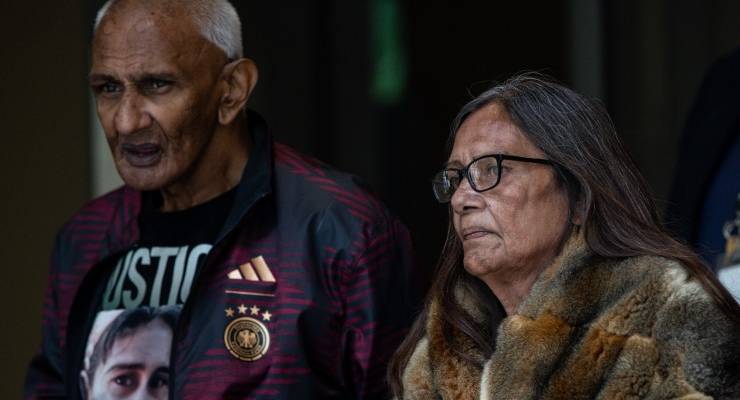
Aboriginal and Torres Strait Islander readers are warned that the following mentions a deceased person.
In delivering his findings into the death of Veronica Nelson over three hours on Monday morning, coroner Simon McGregor issued a harrowing indictment of the Victorian government’s “tough on crime” approach.
Nelson, a 37-year-old Gunditjmara, Dja Dja Wurrung, Wiradjuri and Yorta Yorta woman, died at the Dame Phyllis Frost Centre on January 2 2020. She died in a prison cell as a result of complications of withdrawal from chronic opiate use and undiagnosed Wilkie’s Syndrome, a rare and potentially life-threatening gastrointestinal condition.
McGregor ruled that Nelson’s death could and should have been prevented, and referred the case to the director of public prosecutions. He comprehensively dissected how the criminal justice system had failed Nelson at every single step and condemned the government’s unwillingness to implement recommendations it has had on hand for decades.
Nelson was arrested on warrants for breaching bail and suspicion of shoplifting some fragrance from a chemist. She was denied bail even though these charges would be very likely not to result in imprisonment if she was found guilty.
The coroner called for urgent changes to Victoria’s strict bail laws, which he said have been a “complete and unmitigated disaster” and are disproportionately impacting First Nations women.
The recommendations are strong and damning, and closely mirror those of the Royal Commission into Aboriginal Deaths in Custody from 1991, and what numerous First Nations and legal organisations have been telling the state government for decades.
As McGregor said, state governments have had the answer to prevent deaths such as Nelson’s for more than 30 years, but have failed to deliver them.
“The congruence of the recommendations arising from my investigation into Veronica’s passing and those of the [royal commission] suggests that … implementation of the [royal commission] recommendations has achieved too much policy and not enough change,” he said.
“I find that had the [royal commission] recommendations been successfully implemented by the government and its agencies, Veronica’s passing would more likely than not have been prevented.”
These recommendations include “urgent” legislative amendments to the Bail Act to unwind the strict reforms made in recent years, improved access to cultural support for First Nations peoples in the criminal justice system, improved treatment of those experiencing drug withdrawals and culturally appropriate medical care.
The Andrews government made sweeping changes to its bail laws in 2018 after the Bourke Street attack. These reforms, touted as making it more difficult for violent offenders to be released on bail, have made it more difficult for all people to access bail, with First Nations women most impacted.
McGregor said the new system equated unmet needs with risk and served to target those already experiencing social disadvantage.
“The Bail Act has a discriminatory impact on First Nations people, resulting in grossly disproportionate rates of remand in custody, the most egregious of which affects alleged offenders who are Aboriginal or Torres Strait Islander women,” McGregor said.
These changes have been a “complete and unmitigated disaster”, he said, and should be urgently reviewed and amended.
Nelson’s mother, Aunty Donna Nelson, described her “best friend” and first-born child as a caring and compassionate woman who loved her culture. She finished with a message to the Victorian government and other lawmakers:
I want you to sit and listen to Veronica’s final hours. I want her voice to ring in your ears until you realise that our justice system is broken.
She went on: “Veronica should never have been locked up. You were supposed to change bail laws to stop a white male monster from killing people, but instead you filled our prisons with non-violent Aboriginal women like my daughter, Veronica.
“She should be here with me today. If we do not change bail laws today, it will be someone else’s daughter tomorrow. To the Premier Daniel Andrews, you should hang your head in shame. You need to do your job and get our daughters out of prison.”
The coroner’s findings detail the failures of police, prison staff, lawyers, medical professionals and the state government departments.
These failures spanned from when the police officer arresting her wrongly handcuffed her — an “unjustified and disproportionate” restriction of her human rights — to the lawyer who spent a “clearly insufficient” six minutes with her before a bail hearing where Nelson represented herself, and was denied bail.
She was failed by the doctor who recorded her weight upon reception at the prison to be more than 40 kilograms, when it was recorded as just 33 kilograms a mere two days later. The same doctor didn’t rise from their chair when assessing Nelson’s health and finding she was OK, despite a prison officer saying she appeared to have the worst case of drug withdrawal they had ever seen.
McGregor ruled that Nelson should have been taken straight to hospital after arriving at the women’s prison, and that would have probably saved her life. She was failed by the prison nurse who watched a movie on her computer while Nelson was dying in her cell nearby, and by the prison officer who lied in saying they had called the nurse for help.
Another officer also lied to Nelson in her final hours, telling her she was keeping other inmates awake with her pained cries, despite no people in the prisoner having complained and many having tried to help Nelson.
Nelson was failed by the multiple prison staff and medical professionals who were influenced by a stigma against drug users and those withdrawing from drugs, leading to her complaints being dismissed.
The failures continued after Nelson’s death, with multiple reports by the agencies tasked with investigating her passing producing “grossly inadequate and misleading” reports, most of which said there were no issues with her treatment, the report found.
After McGregor delivered his findings, Nelson’s long-time partner Uncle Percy Lovett echoed the calls for significant reforms: “The government needs to make big changes to stop this from happening again.
“The bail laws have got to be changed — they just have to. Veronica shouldn’t have been in jail; she should have got bail. No one should be in prison for shoplifting.”








How is it no one gets charged with gross neglect or making false reports. Coppers, prison officers and prison nurses none held to account, I’m a sparky if someone dies from my negligence I end up in court facing manslaughter or unlawful death charges, but this lot walk away from it.
Since the workers can’t be trusted to do their jobs, or even consult and cooperate,, it seems clear to me that there needs to be a Manager on Duty 24 hours a day to supervise them and not let them sit there bludging. And that Manager can then be held responsible.
As a medical professional I am disgusted by the conduct of my “colleagues” in this setting. Even a person simply withdrawing from drugs and/or alcohol requires strict medical monitoring and medical management including appropriate medication, to prevent dangerous complications. Substance withdrawal alone often requires hospitalisation, not isolation in a prison cell. This is more than “stigma” – it is medical neglect on a grand scale.
Tanya Day, Veronica Nelson, two women locked up when they shouldn’t have been and both of whom died as a result. Both Aboriginal. So many cases like this this. Hard to believe white women would be treated in the same way. Hard not to draw the conclusion that the prison system is racist and that the Victorian Government doesn’t care.
Thanks Denham.
Is it any surprise that Lydia Thorpe sometimes seems angry?!!!!!
If you live in Victoria, get on the phone right now to your Labor MLA and/or Labor MLC and ask them when they are going to change the bail laws – ‘when’, not ‘if’. Do it now.
Why hasn’t the Victorian government implemented the findings of the Royal Commission into Aboriginal Deaths in Custody?
What difficulties present when trying to implement each of the recommendations?
Could Crikey put those question to Minister for Corrections Enver Erdogan, former minister Natalie Hutchins, and Premier Daniel Andrews, and keep us updated with the status of their responses?